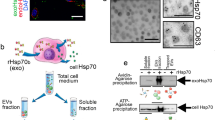Abstract
The cell-surface expression patterns of major histocompatibility complex (MHC) class I, class II and heat-shock protein 72 (HSP72) molecules were measured on human lung (LX-1) and mammary (MX-1) carcinoma cells. No major differences were found in the MHC cell-surface expression pattern of both cell lines. However, they differ significantly in their capacity to express HSP72 on their cell surface. Under physiological conditions LX-1 cells express HSP72 molecules on more than 90% of the cells, whereas MX-1 cells exhibit no significant HSP72 cell-surface expression (less than 5%). These expression patterns remained stable in all further cell passages tested. The sensitivity to lysis mediated by an interleukin-2 (IL-2)-stimulated, adherent natural killer (NK) cell population could be correlated with the amount of cell-surface-expressed HSP72 molecules. By antibody-blocking studies, using HSP72-specific monoclonal antibody (mAb), a strong inhibition of lysis was only found with LX-1 cells but not with MX-1 cells. In contrast to the cell-surface expression, the cytoplasmic amount of HSP72 in MX-1 cells was twice as high compared to LX-1 cells under physiological conditions. After nonlethal heat-shock the rate of induction and the total cytoplasmic amounts of HSP72 were comparable in both cell lines. The clonogenic cell viability of LX-1 cells after incubation at temperatures ranging from 41°C to 44°C was significantly elevated compared to that of MX-1 cells. In conclusion we state the following: (i) HSP72 cell-surface expression on human carcinoma cells is independent of the cytoplasmic amount of HSP72; (ii) the cell-surface expression of HSP72 is associated with an increased sensitivity of tumour cells to lysis mediated by an IL-2-stimulated, adherent NK cell population; (iii) thermoresistance is not related to the cytoplasmic HSP72 level but might be related to the amount of HSP72 expressed on the cell surface.
Similar content being viewed by others
Author information
Authors and Affiliations
Additional information
Received: 20 June 1996 / Accepted: 25 September 1996
Rights and permissions
About this article
Cite this article
Botzler, C., Issels, R. & Multhoff, G. Heat-shock protein 72 cell-surface expression on human lung carcinoma cells is associated with an increased sensitivity to lysis mediated by adherent natural killer cells. Cancer Immunol Immunother 43, 226–230 (1996). https://doi.org/10.1007/s002620050326
Issue Date:
DOI: https://doi.org/10.1007/s002620050326




